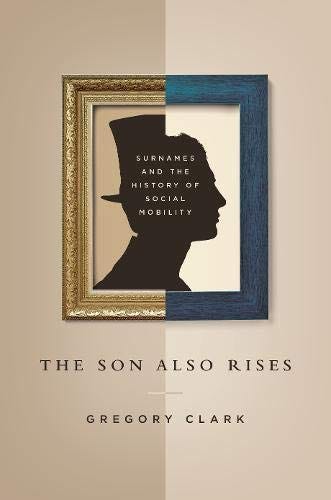Gregory Clark videos
Prior posts touching on Gregory Clark: What does money buy? Selected readings from lottery studies, Thinking about intergenerational stability of socioeconomic status
Updated 2020-02-23: Actually, cancellation comes for Gregory Clark too, Steve Sailer has the story write-up: Economic Historian Gregory Clark's Lecture on "For Whom the Bell Curve Tolls" Is Postponed for Crimethink
Most people are vaguely familiar with the work of Gregory Clark. The general here is that social status is a lot more persistent than commonly thought. To realize this, you simply have to recognize the fact that life outcomes have substantial chance elements. Insofar as these then approximate your congenital potential i.e., expected social status (average), there will be a lot of random error. Because of this, then, if one correlates a measure of social status across generations, this observed correlation does not show the true persistence in the congenital social status, because it is biased downwards by the chance happenings. I say congenital here because it is inborn, but not necessarily genetic, though probably genetic. The traditional psychometric approach here would be to correct the correlations for measurement error, if one can estimate this. However, that's not so easy. But there is another way to avoid measurement error, which is to average across many persons. One way to do this is to track cohorts of related people instead of individuals. Thus, Clark's main analysis tool is studying last names, which since they are transmitted in families, allow us to track the persistence of social status measures across time. The difference between the true average values across generations here will be the error-free persistence of social status. Finally, because averages are easy to estimate with precision, this approach can be used to very accurately estimate the persistence. If one does this, one gets something like this result:
FIGURE 1.6. Conventional versus surname estimates of status persistence.

If we look at a single country, looks like this:
FIGURE 2.10. Relative representation of surname types among attorneys, by birthdate, 2012.
FIGURE 2.12. Relative representation of surname types among Swedish physicians, 1890–2011.
Thus, while neither index is a perfect construct measure of this latent social status (what I called the general socioeconomic factor, S), it is probably very good, so we can use the persistence of any of these. In the ideal world, one would have to adjust for this construct invalidity by essentially dividing by the correlation between latent lawyer ability and latent general social status, which we can guess is around .90 (just my intuitive judgment). Clark doesn't do this, he assumes the value is 1.0. Anyway, to the point of the post, Clark has a new book coming out (he told me 2020). It's another pun title: For Whom the Bell Curve Tolls, I believe from this negative review of his 2014 book.
Anyway, I post these two videos here now because I think they are particularly good, and not well known, so hopefully this post can signal boost them. Youtube has more videos, but I like these two in particular.
Coffee with Cornelius, 2020
https://www.youtube.com/watch?v=IN_-2rILolk
International Society for Intelligence Research, Edinburgh, 2018
https://www.youtube.com/watch?v=_8S-_L4eZQ4
Unequal Chances or Unequal Abilities | Gregory Clark | TEDxSonomaCounty 2016
Just for fun!
https://www.youtube.com/watch?v=0c2Ugb4VKH8

